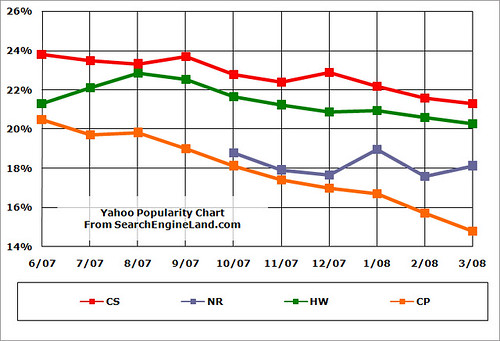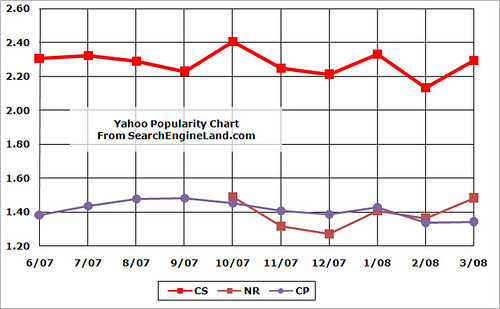Ratings Service Faceoff: Search Share Compared, June 2007 To March 2008
I’ve now compiled the latest search popularity stats from Hitwise, Compete, comScore, and Nielsen Online. That means it’s time to put them all together once again, to see what a "panel" of ratings services agree on — and don’t agree on — in terms of search engine popularity. Why not show a full year’s worth […]
I’ve now compiled the latest
search
popularity stats from Hitwise, Compete,
comScore, and
Nielsen Online. That means it’s time to put them all together
once again, to see
what a "panel" of ratings services agree on — and don’t agree on — in terms of
search engine popularity.
Why not show a full year’s worth of data? Ratings methodology changes mean I
can only go back to June 2007 for comScore and October 2007 for Nielsen. Also,
in terms of raw number of searches, Hitwise doesn’t report these, so they aren’t
on the number of searches charts below.
Services shown in the charts blow:
- CS stands for comScore
- NR stands for Nielsen Online
- HW stands for Hitwise
- CP stands for Compete
The charts show the share of searches in the United States that each ratings
service estimates each search engine to have. In other countries, shares will be
different — often dramatically so.
Finally, the charts use different scales. Rather than running them all from
zero to 100 percent, I’ve tightened them between low and high marks unique to
each service. This can make ups-and-downs seem more dramatic, but it also means
you can better see specific changes with each service.
Everyone but Compete agrees — Google’s share shown in the chart above had
either hit an all-time high or tied it from the previous month
In terms of number of searches, everyone agrees that Google is at an all time
high. But NetRatings reports significantly fewer searches than the other two
services. (Figures above are in billions.)
Yahoo
NetRatings and Hitwise say that Yahoo has had worst months than March, while
comScore and Compete put it at an all-time low.
In terms of number of searches, Yahoo comes off better, relatively stable
over the period according to comScore and NetRatings. (Figures above are in
billions.)
Microsoft
Both NetRatings and Compete show a spike upward for Microsoft — Compete
dramatically so. For the others, a slight decline, less dramatic than in some
past months. (Postscript: See below about Compete results now being adjusted downward).
In terms of number of searches, everyone shows a better picture for
Microsoft, with gains. Note the large leap by Compete, bringing its measurements
nearly in line with the other two. Did Microsoft gain that much, or did how
Compete measures Microsoft change?
POSTSCRIPT:Compete counted searches in March from Club Live that it thought it was filtering out, which inflated the Microsoft figures. I’m not going to redo all the charts due to the time involved. Future charts will reflect the new figures. Microsoft had a 8.5% share for March, rather than 10.2%. See Microsoft Dips In Compete’s Revised March 08 Search Figures for more.
Caveat Time!
As a reminder, my general rules when evaluating popularity stats:
- Avoid drawing conclusions based on month-to-month comparisons. Lots
of things can cause one month’s figures to be incomparable to another month.
It’s better to see the trend across multiple months in a row.
- Avoid drawing conclusions based on one ratings service’s figures.
Each service has a unique methodology used to create popularity estimates.
This means that ratings will rarely be the same between services. However, a
trend that you see reflected across two or more services may give you faith in
trusting that trend.
- Consider Actual Number Of Searches: While share for a particular
search engine might drop, the raw number of searches might still be going up
(and thus they might be earning more money, despite a share drop). This is
because the "pie" of searches keeps growing, so even a smaller slice of the
pie might be more than a bigger slice in the past.
Opinions expressed in this article are those of the guest author and not necessarily Search Engine Land. Staff authors are listed here.
Related stories
New on Search Engine Land





